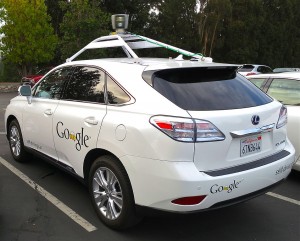Will Humanists Embrace Emerging Technology before Others?
 A Lexus RX450h retrofitted by Google for its driverless car fleet. Photo by Steve Jurvetson
A Lexus RX450h retrofitted by Google for its driverless car fleet. Photo by Steve Jurvetson Humans’ ability to create tools that make it easier to survive is one of several characteristics that distinguish us from most other animals that inhabit this planet. Of course, inventors and corporations don’t focus solely on things that ensure survival—they create new tools to make our lives more enjoyable and, in some ways, more complex. And there is hesitancy on some people’s part to embrace the concept of technological innovation, either from a specific fear of new technology or from a more general concern about what technology’s impact will be on human society and the individual.
Take for example two new inventions that have a potential to improve human life by removing human error from volatile situations. The first, a “smart gun” that works only if the person using the gun is wearing a unique wristwatch, has the potential to remove much of the collateral damage associated with gun ownership. We’ve all heard the tragic stories of kids playing with unsecured guns and harming themselves or others. These new guns could seemingly prevent this situation, saving the lives of countless people and making guns safer for those who own them. And yet, 2nd Amendment advocates used death threats and other intimidation tactics to force at least two gun dealers (one in Maryland and another in California) to stop selling the Armatix iP1 smart gun. Many see it as a backdoor form of gun control, but also express a level of doubt in the technology and worry they won’t be able to shoot if an intruder enters their home.
Another emerging technology that promises to make a dangerous situation safer is the famous self-driving car that has captivated the attention of the media and science fiction nerds everywhere. This technology has the potential for serious application, especially when you consider that around 90% of automobile accidents are the result of human error.
And yet, when I spoke to colleagues I heard a lot of hesitation about whether they personally would use the self-driving car or the smart gun (although in the latter case most of them aren’t interested in using any type of gun). Most of their hesitation centered on the capacity of the products to perform without errors, as the damage incurred from either product malfunctioning could be enormous. But I also noticed in their hesitation something that I’ve seen when speaking to other humanists about emerging technologies: a general unease that as we become more eager to embrace technological innovations we lose a certain control and we become less “human.”
Obviously, this perspective on the role of technology in human existence is not shared by all humanists, as evidenced by the increasing popularity of the transhumanist movement and its numerous offspring. And while I personally disagree with this outlook, I think it is something that is important for us to understand and confront.
The argument against the increased use of some forms of technology still allows for some relationship between new inventions and humanity, as this argument is not based on the old Luddite fears of “sinful technology.” Still, those who oppose a complete embrace of emerging technologies are concerned that as we become more connected to our devices we become less connected to each other, and with that loss of connection comes the loss of certain important human values like empathy and altruism. The thinking goes that as we rely more on technology and less on each other that our ability to fundamentally understand our fellow human beings and their circumstances is limited. With this limitation in human understanding and a decrease in interpersonal contact in favor of artificial contact (social networking, for example) comes social isolation and a global society behaving in an increasingly individualistic and anti-social manner.
Humanists are uniquely affected by this issue, as we maintain the occasionally contradictory beliefs in our own ability and responsibility to improve our collective quality of life through human ingenuity and our dedication to values like altruism. If the technological naysayers are right, then our attempts to improve our world through technological innovation will decrease the altruism felt and acted upon by an increasingly isolated humanity. In the future, will we be free from the deprivation of base physical necessities because of technological advancements while simultaneously being deprived of tangible human relationships because of those very same advancements?
This is something all humanists should consider as they purchase the latest gadget or work themselves to create some new tool. Are the transhumanists right in thinking that technological innovation will not only free us from our physical wants but will also create a more egalitarian and cooperative society, or are those who fear this future and its potential impact on the human psyche to be believed? I hope for all of our sakes that the former is the case, and for the time being I believe it to be the more likely outcome.
